The classic Fourth Doctor story ‘Genesis of the Daleks’ aired some three years prior to the popular science fiction series Blake’s 7. But how instrumental was this serial in Blake’s 7‘s development?
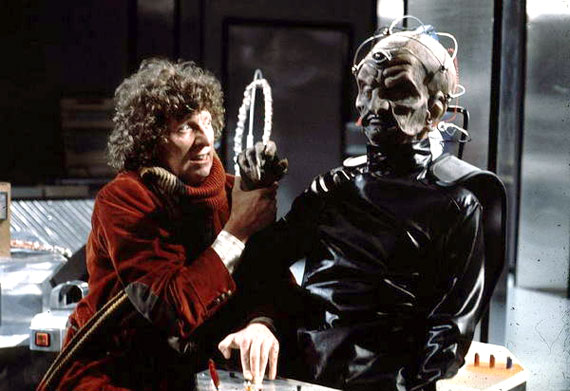
The first thing to note (and indeed, most SF fans will know this already) is that both Blake’s 7 and ‘Genesis of the Daleks’ share the same writer. Dalek creator Terry Nation – who invented the metal mutants back in 1963 – devised Blake’s 7, pitching it to the BBC as “The Dirty Dozen in space.” Essentially, his concept centred around a ragtag band of rebels fighting the good fight in the far future against a totalitarian regime whose iron fist was squeezing the freedom out of the galaxy.
This regime was known as the Federation, who oppressed and controlled its hapless citizens and crushed all who opposed. And it doesn’t take a massive stretch of the imagination to see the parallels to Nazi Germany, and indeed this was one of the major inspirations for Blake’s 7.
But Nazism was also a big inspiration for ‘Genesis of the Daleks.’ As many of you will know, the Daleks were based on Hitler’s regime – merciless killers who exterminated all who were different from them and didn’t submit to their rule.
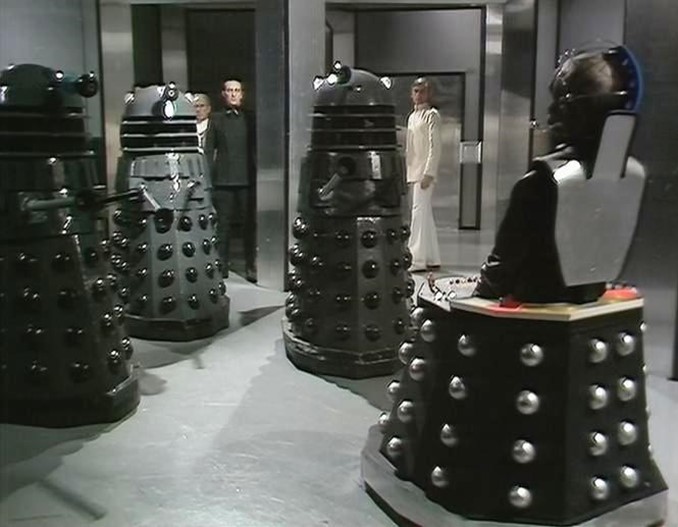
And, arguably, these parallels are most obvious in ‘Genesis of the Daleks.’ In the 1975 serial, the Thaals (the oppressed inhabitants of the planet Skaro) are in the midst of a long and bloody war against the Kaleds, who would later become the Daleks. And the battle has raged for so long that the warriors have resorted to using 20th century technology in a desperate bid to defeat their enemies. Essentially, ‘Genesis of the Daleks’ depicts a thinly-disguised, science fiction allegory of the Second World War.
And this is essentially what Blake’s 7 is, at least in the beginning. As in ‘Genesis of the Daleks,’ the planet’s inhabitants are living within a domed city, deprived of their freedom. And whilst the dissidents in ‘Genesis’ would often be subject to death by Dalek, the rebels in Blake’s 7 are massacred by the black-clad, faceless troops that make up the Federation death squad.
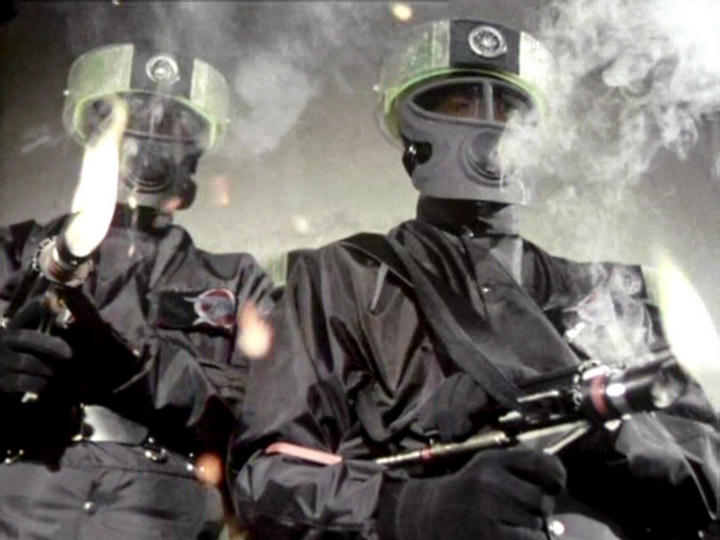
As such, the themes of fascism and injustice are the first clear links between these two works. And whilst the first episode of Blake’s 7 is arguably bleaker in tone than ‘Genesis of the Daleks,’ it is worth noting that (surprisingly) both were broadcast during tea-time family slots.
At the same time, one would be hard-pressed to make a distinction between the aesthetics. Both Blake’s 7 and ‘Genesis of the Daleks’ are noticeably monochromatic in their art design, both opting for palettes that heavily incorporate blacks, whites and dull greens. The visual impression of both of these worlds is a bleak one, and indeed one could be tricked into thinking that both Blake’s 7 and ‘Genesis of the Daleks’ occupy the same universe.
And whilst this similarity might not be intentional, it’s worth remembering that ‘Genesis of the Daleks’ director David Maloney was the producer of Blake’s 7‘s first three seasons. Moreover, both shows shared many of the same cast and crew members, including model designer Matt Irvine, composer Dudley Simpson, costume designer June Hudson, and even actors such as Peter Miles who played the villainous Nyder in ‘Genesis.’ He crops up in Blake’s 7‘s first season as the (slightly) less villainous Rontane – although he’s definitely not a goodie.
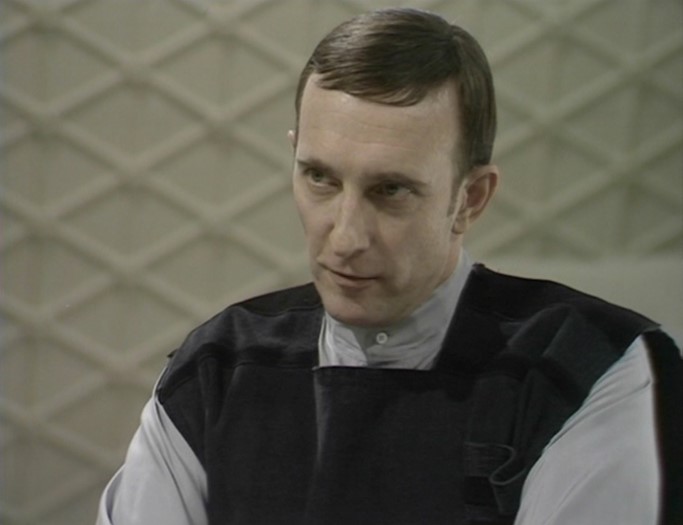
However, these things could easily be written off as coincidental. It’s hardly unusual for two BBC shows, produced at roughly the same time, to enlist similar production teams.
But the most clear link between the two is in the themes and tone. Clearly, Terry Nation had a fascination with Nazi Germany, and even though he had been using it as inspiration in Doctor Who as far back as 1963, he raises the stakes in ‘Genesis of the Daleks,’ opting for something altogether more gritty and adult. Indeed, ‘Genesis of the Daleks’ shocked viewers with one of the series’ most disturbing cliffhangers (the Doctor being strangled by a Kaled mutant) and Blake’s 7 went one step further by framing the protagonist for child molestation – a far cry from the more whimsical villainy of 1965’s ‘The Chase.’
And then there are the antagonists. Every action series needs a good villain, and ‘Genesis of the Daleks’ selected the deranged and deformed Davros to square up to the Doctor. His ultimate dream for the Kaled race was for them to become unfeeling, robot-like creatures with a penchant for racial purity.
And Blake’s 7, too, had a deformed villain in the shape of Space Commander Travis, played by Stephen Greif. He may have possessed (slightly) more humanity than Davros, but he was similarly one-track-minded with one all-consuming obsession: to destroy the rebel Blake. And like Davros, Travis also had a facial deformity, albeit a more subtle one; a chunk of his face was concealed behind an eye patch, which masked the wound inflicted on him by the eponymous hero.
And whilst Travis wasn’t as invested in scientific malpractice as the demented Davros, the themes of genetic experimentation and chemical warfare link the two. In ‘Genesis of the Daleks,’ we have Davros’ scientific team creating their own breed of Kaled mutants to occupy the Dalek shells, and in Blake’s 7 the Federation’s citizens are controlled through suppressant drugs that are seeded into the food and water. And then there is the episode ‘Project Avalon,’ where Travis greenlights a fast-acting virus that he intends to plant on Blake’s spaceship and kill him.
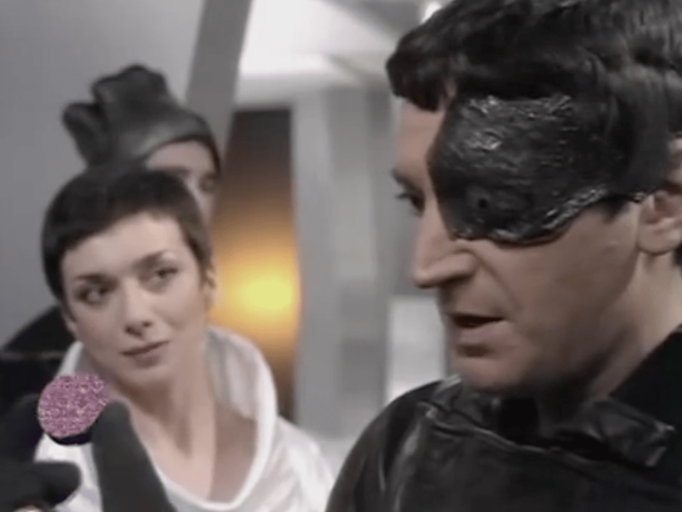
To say, then, that ‘Genesis of the Daleks’ directly inspired Blake’s 7 may be something of an over-simplification. But it would be fair to say that ‘Genesis’ was something of a precursor. Watching the 1975 serial, it is clear that Terry Nation is starting to develop the themes of war and subjugation and elevate them in tone into something more rounded. He is building a more layered and gritty universe in ‘Genesis’ which – by the time of Blake’s 7 – is fully fleshed-out and isn’t simply a heroic tale of good versus evil. The universes of both works are murky and bleak in every sense – particularly themes, characters and aesthetic.
So would Blake’s 7 have happened if it hadn’t been for ‘Genesis of the Daleks’? Probably, but had it arrived earlier – or even later – it probably would have been a very different show. Blake’s 7 feels like a natural successor to the 1975 Doctor Who story, and could arguably be considered a ‘spiritual sequel.’
But what do you think? Did ‘Genesis of the Daleks’ inspire Blake’s 7? And if you’ve never seen Terry Nation’s cult SF series, are you now inspired to watch it? Let me know in the comments below.

Tom Baker scarf – order now from the Lovarzi shop!
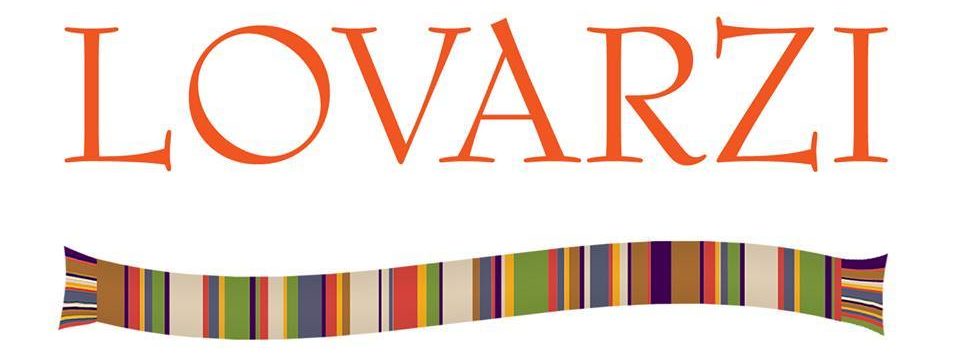







You need to rewatch Blakes 7. The arch-baddy equivalent of Davros is Servalan, not Travis. Travis is a tool of the regime, blindly loyal and ultimately betrayed by the regime, more akin to Ronson.
The closest equivalent is Servalan, each seeking total domination of their universes, and both overthrown by their new regimes.
However all a bit tenuous.
Both Blakes 7 and the Daleks were created and written by the same writer, who had a penchant for recycling plots time and again.
Trying to bend readings of both to “prove” similarities whilst omitting glaring differences is tenuous and ultimately pointless.